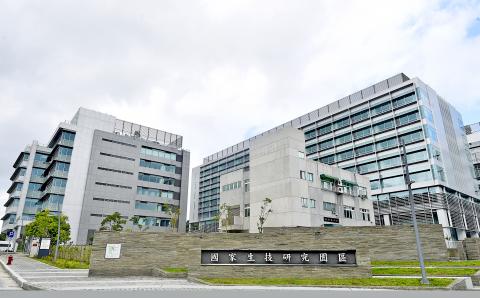More than 80 percent of the commercial space at the National Biotechnology Research Park opened last year in Taipei’s Nangang District (南港) has still not been rented out, with only eight firms having moved into the buildings, Academia Sinica said yesterday.
The complex of several buildings near Academia Sinica was inaugurated by President Tsai Ing-wen (蔡英文) on Oct. 15 last year, almost a decade after the Executive Yuan approved construction plans in 2009.
The Food and Drug Administration, National Laboratory Animal Center and Ministry of Economic Affairs’ Development Center for Biotechnology, and several Academia Sinica research centers have moved into the park, but it is unclear whether private-sector firms are interested, with only a handful of biotechnology and biomedicine companies renting space.

Photo: Chien Jung-fong, Taipei Times
In comparison, the Hsinchu Biomedical Science Park, which houses a National Taiwan University Hospital branch, last month housed 55 companies, Ministry of Science and Technology data showed.
The Nangang park’s incubation center — BioHub Taiwan — is to hold an information meeting for start-ups and other companies on March 27, Academia Sinica said.
The institution is represented on the park’s management board and is responsible for the facility’s public relations.
BioHub Taiwan also plans to invite international biomedicine accelerators to enter the park and bring in venture capital funding to make it more attractive, it said.
Academia Sinica is not the only party responsible for attracting tenants, but it hopes to make the park a success, Academia Sinica President James Liao (廖俊智) said.
Government funding for basic research is limited, so the public should lend basic research more support, instead of expecting instant results, Liao said.
To improve traffic conditions in the vicinity, the Taipei City Government plans to construct a tunnel between the park and Nangang Railway Station, which lies on the other side of a hill, Academia Sinica Secretary-General Peng Shin-kun (彭信坤) said.
However, construction might take five years due to the time needed for environmental impact assessment procedures, Peng said.

Three Taiwanese airlines have prohibited passengers from packing Bluetooth earbuds and their charger cases in checked luggage. EVA Air and Uni Air said that Bluetooth earbuds and charger cases are categorized as portable electronic devices, which should be switched off if they are placed in checked luggage based on international aviation safety regulations. They must not be in standby or sleep mode. However, as charging would continue when earbuds are placed in the charger cases, which would contravene international aviation regulations, their cases must be carried as hand luggage, they said. Tigerair Taiwan said that earbud charger cases are equipped

Foreign travelers entering Taiwan on a short layover via Taiwan Taoyuan International Airport are receiving NT$600 gift vouchers from yesterday, the Tourism Administration said, adding that it hopes the incentive would boost tourism consumption at the airport. The program, which allows travelers holding non-Taiwan passports who enter the country during a layover of up to 24 hours to claim a voucher, aims to promote attractions at the airport, the agency said in a statement on Friday. To participate, travelers must sign up on the campaign Web site, the agency said. They can then present their passport and boarding pass for their connecting international

Temperatures in northern Taiwan are forecast to reach as high as 30°C today, as an ongoing northeasterly seasonal wind system weakens, the Central Weather Administration (CWA) said. CWA forecaster Tseng Chao-cheng (曾昭誠) said yesterday that with the seasonal wind system weakening, warmer easterly winds would boost the temperature today. Daytime temperatures in northern Taiwan and Yilan County are expected to range from 28°C to 30°C today, up about 3°C from yesterday, Tseng said. According to the CWA, temperature highs in central and southern Taiwan could stay stable. However, the weather is expected to turn cooler starting tonight as the northeasterly wind system strengthens again

Taiwan sweltered through its hottest October on record, the Central Weather Administration (CWA) said yesterday, the latest in a string of global temperature records. The main island endured its highest average temperature since 1950, CWA forecaster Liu Pei-teng said. Temperatures the world over have soared in recent years as human-induced climate change contributes to ever more erratic weather patterns. Taiwan’s average temperature was 27.381°C as of Thursday, Liu said. Liu said the average could slip 0.1°C by the end of yesterday, but it would still be higher than the previous record of 27.009°C in 2016. "The temperature only started lowering around Oct. 18 or 19